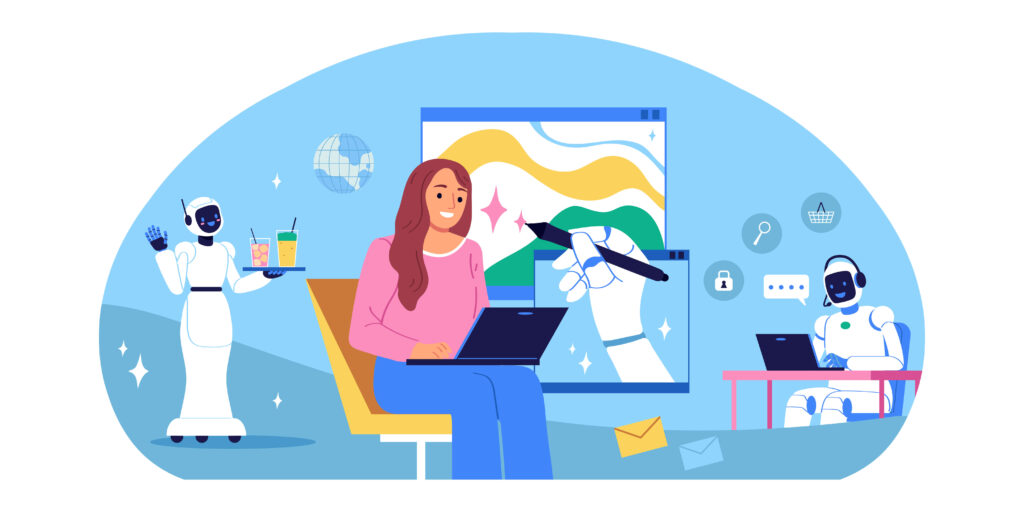
In the ever-evolving landscape of employment, one term has been making waves – Artificial Intelligence, affectionately known as AI. But what’s the deal with AI? Is it just another tech trend, or does it hold the keys to high-paying jobs and a brighter future of work? Let’s dive in and demystify the world of AI moolah.
The AI Revolution: A Brief Overview
Before we dissect the lucrative potential of AI careers, let’s grasp the basics. Artificial Intelligence is the branch of computer science that empowers machines to simulate human intelligence. It’s all about teaching computers to think, reason, and learn like us, Homo sapiens. But why is this even relevant to the future of work?
Question: Is AI Here to Stay?
Answer: Absolutely. AI is no one-hit wonder. It’s here for the long haul, and it’s evolving at warp speed.
AI is the backbone of several groundbreaking technologies, such as self-driving cars, voice assistants like Siri and Alexa, and even predictive text on your smartphone. Companies across industries are harnessing AI’s power to streamline processes, make data-driven decisions, and provide personalized customer experiences.
The Gold Rush: Lucrative AI Roles
Now, let’s talk turkey – the money. AI isn’t just about creating nifty gadgets; it’s a gold mine for high-paying job opportunities. Here are some AI roles that can fill your pockets with AI moolah:
- Data Scientist: If data is the new oil, data scientists are the oil barons. These wizards wrangle massive datasets to extract valuable insights, helping companies make strategic decisions. Average salary? North of $100,000 annually!
- Machine Learning Engineer: These are the folks who teach machines to learn from data. Think self-improving algorithms and recommendation systems. With an average salary of $120,000+, it’s a promising career choice.
- AI Research Scientist: Are you fascinated by the cutting edge of AI? Research scientists push the boundaries, working on AI breakthroughs. Salaries often exceed $150,000!
- AI Product Manager: Combining tech and business acumen, AI product managers steer the development of AI-powered products. It’s a strategic role that pays handsomely, often crossing the $140,000 mark.
- AI Ethicist: As AI’s influence grows, ethical concerns arise. AI ethicists ensure that AI systems align with human values and ethics. They earn substantial salaries, averaging $130,000 or more.
Question: Do These Salaries Sound Too Good to Be True?
Answer: While they are impressive, these salaries reflect the demand for AI expertise and the significant impact AI has on various industries.
Why the AI Roles Pay Big Bucks

So, why are these AI roles showered with cash? Let’s unravel the reasons behind the fat paychecks:
- High Demand, Low Supply: AI talent is a rare breed. The demand far surpasses the supply of qualified professionals, driving up salaries. Companies are willing to pay top dollar to secure AI talent.
- Transformational Impact: AI isn’t a peripheral technology; it’s at the core of business transformations. AI can optimize operations, enhance customer experiences, and boost profits. Hence, companies are willing to invest heavily in AI roles to stay competitive.
- Complexity and Specialization: AI roles often require specialized skills and deep expertise. Whether it’s designing neural networks or fine-tuning algorithms, the complexity of the work justifies the hefty paychecks.
- Data-Driven Decision-Making: In the data-driven era, businesses rely on AI to make critical decisions. AI professionals are the gatekeepers of this data-driven future, and they’re compensated accordingly.
The Skills That Pay the Bills
Now, you might be wondering, “What do I need to snag one of these AI gigs?” Well, here’s the lowdown:
- Math and Statistics: A solid foundation in mathematics and statistics is non-negotiable. Machine learning and data science are math-heavy domains.
- Programming Skills: Proficiency in programming languages like Python and R is a must. These are the tools of the trade for AI professionals.
- Machine Learning Algorithms: Understanding machine learning algorithms is like having a superpower in the AI world. It’s the essence of AI.
- Domain Knowledge: AI isn’t a siloed field. It infiltrates various industries. Having domain-specific knowledge, whether in healthcare, finance, or e-commerce, is a plus.
Question: Can Anyone Learn AI and Cash in on This Gold Rush?
Answer: Absolutely! While it takes dedication and effort to acquire the necessary skills, AI is an open field waiting for passionate learners.
Riding the Wave: Future Prospects
The AI juggernaut isn’t slowing down. In fact, it’s only picking up speed. Here’s what the future holds for AI roles:
- AI in Healthcare: AI is set to revolutionize healthcare with diagnostic tools, personalized treatment plans, and predictive analytics. The demand for AI professionals in healthcare will soar.
- AI in Finance: Financial institutions are increasingly turning to AI for fraud detection, algorithmic trading, and risk assessment. Financial AI experts will remain highly sought after.
- AI in Entertainment: AI is making waves in the entertainment industry, from AI-generated music to virtual actors. This sector will create exciting opportunities for AI creatives.
- AI in Sustainability: AI can help tackle climate change through predictive modeling, resource optimization, and sustainable practices. AI experts with a green agenda will be in demand.
The Elephant in the Room: Job Displacement
While AI brings new opportunities, it also raises concerns about job displacement. Will AI replace humans in the workforce?
Question: Will AI Steal Our Jobs?
Answer: AI may automate certain tasks, but it also creates new roles. Adaptability and upskilling will be key to thriving in the AI-driven job market.
AI will automate repetitive, rule-based tasks, but it can’t replicate human creativity, empathy, and critical thinking. Jobs that require these uniquely human qualities are safe from the AI takeover.
The Human Touch: AI and Human Collaboration

The future of work isn’t a battle between humans and machines; it’s a dance of collaboration. AI can augment human capabilities, making us more efficient and innovative.
Imagine doctors using AI to assist in diagnosis, teachers using AI for personalized education plans, or architects using AI to design eco-friendly buildings. These collaborations promise a brighter future where humans and AI work hand in circuit.
Seize the AI Moolah!
In the grand scheme of things, AI isn’t just a tech fad; it’s a seismic shift in the world of work. High-paying AI roles are not a mirage; they’re a tangible reality for those willing to invest in learning and adapting.
So, if you’re eyeing a career that combines cutting-edge technology with fat paychecks, consider hitching a ride on the AI wave. The future of work is here, and it’s powered by AI moolah. Are you ready to seize it?
FAQ: AI Moolah – High-Paying AI Roles and the Future of Work
We understand that the world of high-paying AI roles can be intriguing yet puzzling. To help you navigate this AI landscape, we’ve compiled a list of frequently asked questions (FAQs) and provided concise answers to give you a clearer picture.
- What are high-paying AI roles?
Answer: High-paying AI roles are job positions in the field of Artificial Intelligence that offer significantly above-average salaries. These roles typically involve tasks related to data analysis, machine learning, AI research, and product development, among others.
- What is the average salary for AI professionals?
Answer: The average salary for AI professionals can vary depending on factors like experience, location, and the specific role. However, many AI roles offer salaries that range from $100,000 to well above $150,000 per year.
- Is AI a long-term career option?
Answer: Yes, AI is considered a long-term career option. The field of AI continues to grow and evolve, with increasing applications in various industries. As AI technology advances, the demand for skilled professionals is expected to remain strong.
- What skills are needed for a career in AI?
Answer: Key skills for a career in AI include a strong foundation in mathematics and statistics, proficiency in programming languages like Python and R, understanding of machine learning algorithms, domain-specific knowledge, and problem-solving abilities.
- Are there opportunities for AI professionals in specific industries?
Answer: Yes, AI professionals can find opportunities in a wide range of industries. Some prominent sectors include healthcare, finance, entertainment, and sustainability. AI is versatile and can be applied to address challenges and create innovative solutions in various domains.
- Will AI lead to job displacement?
Answer: While AI may automate certain tasks, it also creates new job roles. Jobs that require human creativity, empathy, critical thinking, and decision-making skills are less likely to be replaced by AI. Adaptability and upskilling will be essential to thrive in the changing job market.
- How can I start a career in AI?
Answer: Starting a career in AI typically involves acquiring the necessary skills through education, online courses, or bootcamps. Building a portfolio of AI projects and gaining practical experience can also be valuable. Networking with professionals in the field and staying updated on AI advancements is essential.
- What is the future of work in the AI era?
Answer: The future of work in the AI era is characterized by collaboration between humans and AI. AI can augment human capabilities, making tasks more efficient and innovative. It’s an era where humans and AI work together to achieve common goals.
- Are AI roles accessible to everyone?
Answer: Yes, AI roles are accessible to anyone willing to invest time and effort in learning and acquiring the necessary skills. The field of AI welcomes passionate learners from diverse backgrounds.
- How do I stay updated on AI trends and advancements?
Answer: Staying updated on AI trends can be achieved through online courses, industry publications, attending AI conferences and webinars, following AI experts on social media, and participating in AI communities and forums.